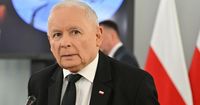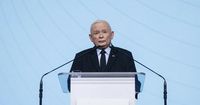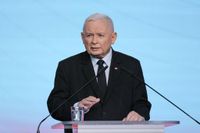In a developing story that has sent ripples through Polish politics, a prosecutor's investigation has been initiated regarding the actions of members of the ruling party, PiS (Law and Justice), during an incident at Telewizja Polska (TVP) in December 2023. This investigation, which commenced on April 4, 2025, is focused on allegations of abuse of power and violation of domestic peace, potentially implicating high-profile party leaders, including Jarosław Kaczyński.
According to reports from Rzeczpospolita, the District Prosecutor's Office in Warsaw has launched an inquiry into events that transpired between December 20, 2023, and the end of that month. The inquiry centers on the alleged unauthorized entry of PiS MPs into the headquarters of TVP and the Telewizyjna Agencja Informacyjna (TAI) at ul. Woronicza 17 and Pl. Powstańców Warszawy 7. The MPs reportedly refused to leave the premises, exceeding the limits of parliamentary intervention.
The events leading to this investigation are rooted in a controversial resolution passed by the Sejm on December 19, 2023, aimed at restoring legal order and ensuring the impartiality of public media, including the Polish Press Agency. On the same day, then Minister of Culture Bartłomiej Sienkiewicz dismissed the authorities of various media outlets, including TVP, which raised questions about the legality of such actions. With the National Media Council, predominantly appointed by PiS, holding the actual authority to make such dismissals, the MPs' intervention was seen as an overreach.
In the wake of these developments, the prosecution's investigation has drawn particular attention due to the involvement of prominent PiS figures. Alongside Kaczyński, the inquiry reportedly includes MPs Jacek Ozdoba, Paweł Szrot, and Dariusz Matecki, who are said to have played significant roles in the alleged occupation of TVP's headquarters. As noted by Rafał Gaweł, the founder of the Ośrodek Monitorowania Zachowań Rasistowskich i Ksenofobicznych (OMZRiK), which filed the complaint leading to the investigation, these individuals are considered the main perpetrators of the incident.
Moreover, the investigation is not limited to the actions at TVP. It also examines similar behaviors exhibited by PiS MPs at the Polish Press Agency building, where there are allegations of violence, including the unlawful deprivation of journalists' freedom and public insults aimed at media personnel. These claims highlight a troubling trend of governmental overreach and hostility toward the press.
The implications of this investigation could be profound, especially for Kaczyński, who has long been a central figure in Polish politics. His leadership of PiS has been marked by significant controversy, particularly regarding media freedom and the relationship between the government and the press. Observers note that should the investigation lead to formal charges, it could represent a critical moment in the ongoing tensions between the ruling party and independent media.
As the investigation unfolds, it raises pressing questions about the limits of parliamentary intervention and the protection of journalistic freedom in Poland. The actions of the MPs, described in the prosecutor's documents as "acting with a premeditated intention to harm the public interest through the abuse of power," underscore the precarious balance between political authority and media independence.
In light of these events, many are watching closely to see how the ruling party responds. The political landscape in Poland is already fraught with divisions, and this investigation could further exacerbate tensions between the government and opposition parties, as well as among the public.
While Kaczyński and his allies maintain that their actions were justified as a necessary response to perceived threats against public order and media integrity, critics argue that such justifications cannot excuse the alleged violations of law and ethics. The ongoing scrutiny by the prosecutor's office is a reminder that accountability mechanisms are essential in a functioning democracy.
As the situation develops, it will be crucial for the public and media to remain vigilant about the implications of this investigation. The outcome could shape not only the future of the PiS party but also the broader discourse on media freedom and governmental authority in Poland.
In summary, the investigation into the actions of PiS MPs at Telewizja Polska highlights significant concerns regarding the abuse of power and the treatment of journalists in Poland. With high-profile figures potentially facing legal repercussions, the story is still unfolding, and its consequences may resonate throughout the political landscape for years to come.







